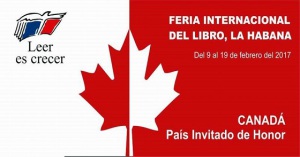Several weeks ago, the 26th International Book Fair 2017 took place in Havana, Cuba. This year it was dedicated to Canada and to the Cuban revolutionary Armando Hart Dávalos.
As in previous years, the event was held at the former military fortress of San Carlos de La Cabaña. Built by the Spanish government in the early years of the 18th century to protect the Havana Bay from attacks of privateers and pirates, it regained fame in 1959 when it became Che Guevara’s headquarters and a prison for thousands of men convicted of political crimes. In a way, the fortress is also seen as one of the symbols of the Revolution – a reminder of the prisoners shot against its walls.

For more than a week in February 2017, the Book Fair created a haven for up to seven million texts of various literary genres. Books were sold for both national and convertible pesos, depending on the publishing house and the readership they were addressing.
There were fewer foreign publishers and exhibitors in comparison with the previous years and although there was – for the first time in the history of the Book Fair, an outdoor marquee with stalls, its windowless tiny cells were just as suffocating as the remaining facilities of the event.
As usually, the main event of the Book Fair was the presentation of the Alejo Carpentier Prize for fiction, the Nicolás Guillen Prize for poetry and the “Razón de Ser” Award (translated as “Reason for Being”) for five best book projects under the auspices of the Carpentier Foundation. Also, the National Prize for Literature was awarded to Margarita Mateo and the books that won last year’s literary contests were released. The program of the Book Fair included reciting of poetry, reading of stories and debates with Cuban and foreign cultural figures.
Yet, if you ask whether all outstanding Cuban writers were given the opportunity to appear on the sales stalls or whether the essential works of world literature were offered for sale, the answer is most probably no.
Rene Villar, a passionate reader who has never missed the opportunity to attend the Book Fair, told us that he could not find the books he was looking for. In general, he said, he wouldn’t be able to afford to pay the prices for the books.
“I was looking for El Monte by Lidia Cabrera, but I was not able to find it. The few books I was interested in that I did find, however, cost between 5-10 convertible pesos. Many people may think that it’s not a high price for a good book, but still, it’s 240 Cuban pesos, which is half of my salary as a specialist of the Institute of Geodesy and Cartography.”
Adelaide, another regular visitor, tried to obtain bulk discount as she intended to resell the purchased goods, but she told us that the prices of almanacs and postcards had gone up. The same applied to interactive and didactic books. “The prices were in convertible pesos and I wouldn’t make any profit if I bought anything.”
Clara, mother of two little girls, complained not only about the prices but also about the transport to the venue, whose quality suffered in comparison with the previous years. “We had to wait for two hours before we could get to La Cabaña and for two more when we wanted to return. In the end, I had to take a taxi to get back home because the girls started vomiting; they had eaten something bad. It must have been the sandwiches with paste.”
Celso Casas, former high school teacher currently working as a curator of a social club, says that half of the books he saw at the Book Fair were of political content. “There were many books on Fidel, Che, Raúl Castro, Armando Hart, Hugo Chávez and there were dozens of socialist philosophy guidebooks. The interesting thing was that most people purchased children’s books and cookbooks.”
A good reflection on the Havana International Book Fair could perhaps be the following: it is not an inclusive event, it only promotes leftist writers, mainly those who are considered “forward-looking”. The damp, dark cells that were once used as dungeons and torture rooms failed to offer to the visitors many valuable works of world literature. There was no chance one could come across books written by Aleksandr Solzhenitsyn, Boris Pasternak, George Orwell or Mario Vargas Llosa, not to mention banned Cuban writers like Guillermo Cabrera Infante, Herberto Padilla or Reinaldo Arenas, or good writers in exile who don’t adhere to the Communist doctrine, or independent writers living in Cuba who are not exactly on friendly terms with the government.

Leave a comment